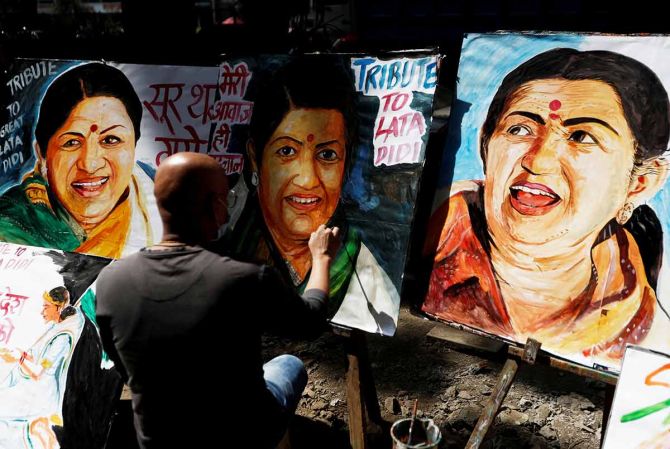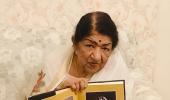We will continue to be enthralled by your golden oldies we grew up with, notes Shreekant Sambrani.

The epicentre of Hindi cinema shifted to Mumbai after Partition.
A sea change in all aspects of film-making followed in its wake, none more so than in the case of its staple, the music.
A whole new crop of voices -- Lata Mangeshkar, Asha Bhosle, Geeta Roy, Mohammad Rafi, Talat Mahmood, Mukesh, Kishore Kumar, Manna Dey -- brought in a gust of fresh air, under the batons of new and old music directors -- Shankar-Jaikishan, S D Burman, O P Nayyar, Madan Mohan, Roshan. C Ramachandra and Naushad, not yet 30, were the seniors.
That meant a whole new musical idiom and grammar, synthesising the best in Indian classical traditions with Western instruments, orchestration and trends.
This was also the most buoyant time for India. It had just emerged from two centuries of colonialism, confident of a bright future despite the many problems it faced.
The films of this period reflected this mood and no one signified it better than Lata Mangeshkar.
She sang with every hope and aspiration of the young nation.
She was the voice of a caring mother, a comforting sister, a playful daughter, a divine lover and a courtesan par excellence.
Her voice was more recognisable than the countless film stars she sang for.
She was truly the diva supreme who enthralled connoisseurs and tone-deaf commoners alike.
Lata became the chief breadwinner of her large family when her father, actor-singer Master Dinanath died early.
She was just in her teens with little training except what she had learnt from her father. That did not seem to matter as even her earliest songs were melodious.
She could sing equally well with little accompaniment or a full orchestra. And her voice could often scale four octaves.
She was born to sing.
No one else could sing many of her memorable songs.
Listen to her earliest hit songs, Aayega Aanewala from Mahal and Koi Mere Dil Me Aaya from Andaz. One haunts you long after the last note and the other is a pure ode to joy.
Lata could sing elegiac melodies and defiant strains, playful lilts and romantic duets, all with equal ease.
Newcomers who began copying her met with little success.
She was in a company of herself, and at times, with her sister Asha, who is now the sole survivor of that golden era.
Lata has been called the voice of India, and rightly so. She sang in most Indian languages.
No one cared about where she was from or what she looked like.
All that mattered was her ethereal singing.
Her composers and lyricists seemed to be vying with each other to offer their best efforts for her voice.
At her peak, in the 1950s, she was easily the most popular artiste in India. Her songs transcended geographies and languages. They went wherever Indians went.
British wags called Aayega Aanewala the curry song of the year 1950. And 1960 and 1970 and all the years in between. That was no exaggerated claim either.
But that was not all.
She used her enormous popularity for other purposes.
She gave concerts to raise funds for worthy causes.
She stood up for the singers' rights.
She got them name recognition on the discs and then in film titles as well.
Her epic struggles to get them a share of the royalties often caused strife within the community, but she was steadfast in her position and ultimately prevailed.
Others could seldom defy her.
She thus became not just the face, but the leader of the film music industry.
She continued singing well past her prime.
Composers mindful of the strain that her vocal cords could bear offered her slower numbers and with different orchestral accompaniments.
But the magic was gone.
No matter.
A grateful industry and an equally thankful nation showered upon her all the honours they could offer.
Go in peace, Lata didi.
We will continue to be enthralled by your golden oldies we grew up with.
Feature Presentation: Ashish Narsale/Rediff.com












 © 2025
© 2025